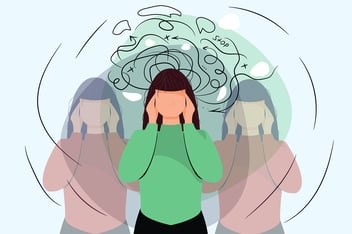Understanding Bipolar Disorder and Its Treatment Options

Although there is currently no cure for bipolar disorder, many people can achieve stability and effectively manage their symptoms through a combination of treatments and lifestyle adjustments. This article overviews bipolar disorder and delves into various treatment options, including psychotherapy, medication, additional therapies, and lifestyle changes.
Achieving stability in bipolar disorder can be challenging and lengthy, often involving trial and error with different medications, supportive therapy, and significant lifestyle changes. However, with patience and cooperation with healthcare providers, finding the right balance of treatments and strategies is possible.
Treatments for Bipolar Disorder
Dr. Aimee Daramus, a licensed clinical psychologist and author of “Understanding Bipolar Disorder,” discusses various treatment options for bipolar disorder, including:
- Therapy
- Medication
- Neurotherapeutics
- Support groups
Therapy
Several forms of psychotherapy have proven effective in managing bipolar disorder, including:
Interpersonal and Social Rhythm Therapy (IPSRT)
IPSRT is a well-established therapy for bipolar disorder that:
- Offers psychoeducation about the illness
- Utilizes mood and activity tracking to encourage consistent daily routines
- Aids in regulating sleep-wake cycles and circadian rhythms
- Identifies and addresses interpersonal problem areas and helps patients process grief for the loss of their healthy self
Cognitive-Behavioral Therapy (CBT)
Cognitive Behavioral Therapy (CBT) is another effective method for addressing bipolar disorder, with an emphasis on:
- Identifying and modifying the link between unhelpful thought patterns and mood symptoms
- Utilizing activities to recognize and change negative thoughts and actions
- Imparting techniques for identifying emerging mood episodes
Additionally, two connected types of psychotherapy, Dialectical Behavior Therapy (DBT) and Mindfulness-Based Cognitive Therapy (MBCT), may prove valuable in managing the condition.
Medication
Various medications can help manage bipolar disorder, including:
- Mood stabilizers: These are the most frequently used medications for bipolar disorder, and they work effectively in averting and managing mood shifts. Lithium is a widely employed primary mood stabilizer; however, it demands regular monitoring of blood levels and assessments of kidney and thyroid performance.
- Anticonvulsants: Some anticonvulsants, also known as antiseizure medications, have mood-stabilizing properties. Valproic acid (Depakote) and lamotrigine (Lamictal) are common examples.
- Antidepressants: These medications can help with depressive episodes but often need to be combined with mood stabilizers or avoided altogether, as they can potentially trigger manic episodes.
- Antipsychotics: These drugs can help control symptoms of mania, depression, and psychosis, such as hallucinations and delusions, that may accompany mood episodes.
Neurotherapeutics
Neurotherapeutic interventions can be an alternative for patients who do not adequately respond to psychotherapy and medications. These treatments involve using devices that impact brain circuitry, including:
- Electroconvulsive Therapy (ECT): ECT involves delivering a minimal electrical current to the brain while the patient is under anesthesia, resulting in a short, regulated seizure. This therapy can occasionally prove beneficial for depressive or manic episodes that are unresponsive to traditional treatments.
- Transcranial Magnetic Stimulation (TMS): TMS involves administering magnetic fields to specific brain areas, potentially helping with certain mood symptoms.
- Light Therapy: Some individuals with mood disorders like bipolar disorder experience a seasonal pattern to their symptoms, often with depressive symptoms worsening in the shorter winter months. Bright light therapy may help alleviate seasonal depression.
Support Groups
Support groups and mental health communities can provide mutual support and shared understanding for individuals living with bipolar disorder. Social support is essential when managing a mental health condition, as it can be challenging to explain the experience of bipolar disorder to those who do not understand it.
Many support groups cater specifically to individuals with bipolar disorder, while others focus on broader mental health issues. Certain groups gather face-to-face, while alternative options include virtual or phone-based meetings to cater to different preferences and requirements. To locate a support group in your vicinity, seek advice from your healthcare professional or nearby mental health associations, or perform an internet search. Seize the chance to build connections with individuals on a comparable path and reap the rewards of mutual comprehension and encouragement.
Coping Strategies
Dr. Daramus, a licensed clinical psychologist and author of “Understanding Bipolar Disorder,” suggests several strategies to help cope with bipolar disorder:
- Take medication as prescribed: Adhere to the directions provided by your healthcare professional and consistently take your medication. Refrain from discontinuing its use without first discussing with your healthcare provider, even if you feel well. Report any adverse effects you encounter to your provider.
- Maintain a regular sleep schedule: Irregular sleep habits can aggravate bipolar disorder symptoms. Ensure you have a consistent sleep routine and get enough sleep daily.
- Foster healthy relationships: Maintaining healthy relationships can be challenging, but relationship stress can exacerbate bipolar disorder symptoms.
- Communicate with loved ones about support: In addition to emotional support, ask loved ones for practical help, such as monitoring spending during a manic episode or checking in on you during a depressive episode.
- Find productive outlets for energy and emotions: Channel energy during manic episodes into work projects or hobbies, and try exercise to use excess energy and improve mood. Engage in creative activities such as music, art, or crafts during depressive episodes to express emotions.
- Practice meditation: Meditation and mindfulness exercises can help manage feelings of sadness, guilt, and helplessness associated with bipolar disorder.
- Avoid substances: Alcohol, tobacco, and drugs can interfere with medication and trigger mood episodes, so it’s crucial to avoid them and focus on treatment.
- Develop a crisis plan: Work with your healthcare provider and loved ones to create a plan for dealing with potential emergencies related to bipolar disorder. This plan can include a list of warning signs, contact information for healthcare providers, and steps to take in a crisis.
- Stay informed: Educate yourself about bipolar disorder and stay updated on new treatment options, research, and coping strategies. Possessing knowledge is empowering, and comprehending your situation allows you to make educated choices regarding your therapy and overall health.
- Establish a routine: Create a daily routine with regular meal times, exercise, and relaxation techniques. This structure can help stabilize your mood and decrease the likelihood of mood episodes.
- Reduce stress: Identify sources of stress in your life and develop strategies for managing them, such as practicing relaxation techniques, delegating tasks, or setting boundaries with others.
- Monitor your mood: Keep track of your mood changes and triggers in a journal or using a mood-tracking app. This information can help you and your healthcare provider identify patterns and adjust your treatment plan as needed.
Conclusion
Although bipolar disorder cannot be cured, attaining equilibrium and successfully handling the condition can be realized through a blend of therapeutic approaches, supportive networks, and alterations in daily habits. With patience, persistence, and cooperation with healthcare providers, individuals with bipolar disorder can find a balance that enables them to lead fulfilling lives. Exploring various treatment options such as psychotherapy, medication, and neurotherapeutics and participating in support groups can significantly contribute to one’s well-being. In addition, implementing coping strategies and maintaining open communication with loved ones strengthens the support network necessary for managing bipolar disorder. Keep in mind that you are not isolated in this journey, and reaching out to experts, support networks, and your personal connections is crucial for effectively managing life with bipolar disorder.
EaseCare Links
Website | Facebook | Instagram | Get help | Free Mental Health Assessment




